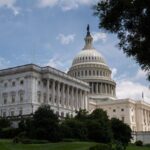By Andrew Moran and Nathan Worcester
House lawmakers passed a landmark stablecoin bill on July 17 in a vote of 308–122, sending it to President Donald Trump’s desk for his signature.
The Genius Act—Guiding and Establishing National Innovation for U.S. Stablecoins Act—aims to establish the first federal framework for stablecoin regulation. Stablecoins are a type of cryptocurrency designed to maintain a nominal value, usually pegged to the dollar one-to-one.
After passing in the Senate in June with a 68–30 vote, the legislation was sent to the House.
The lower chamber rejected a key procedural vote on setting terms for the bill’s floor debate. Lawmakers voted 196–223 on July 15, with 13 Republicans siding with Democrats.
Procedural votes generally capture total majority party support.
After brief uncertainty—and the president’s intervention in the matter—the House eventually voted 217—212 on July 16 to advance the bill to a floor vote.
“President Trump promised to make America the crypto capital of the world,” Rep. Tom Emmer (R-Minn.) told reporters after the votes on a trio of crypto bills.
The House followed through on the president’s pledge by moving forward with an “America First digital assets agenda,” the House majority whip said.
The trio of crypto bills—the Genius Act, the Clarity Act, and the Anti-CBDC Surveillance State Act—will solidify the U.S. dollar hegemony, spark innovation, and ensure “digital money reflects our American values of privacy, individual sovereignty, and free market competitors,” according to Emmer.
White House press secretary Karoline Leavitt confirmed to reporters at a July 17 press briefing that the president is planning a signing ceremony for the Genius Act.
Tough Start to ‘Crypto Week’
House Speaker Mike Johnson (R-La.) had faced opposition from GOP lawmakers, including Rep. Marjorie Taylor Greene (R-Ga.), who wanted to combine the Genius Act with two other cryptocurrency-related bills.
Washington also voted on the Clarity Act and the Anti-CBDC Surveillance State Act this week.
The Digital Asset Market Structure and Investor Clarity Act aims to create a comprehensive market structure for the cryptocurrency sector. The bill enjoyed bipartisan support and passed 294–134. It will now head to the Senate.
The Anti-CBDC Surveillance State Act seeks to prohibit the issuance of a retail central bank digital currency, also referred to as a CBDC. The bill also passed 219–210.
“Americans do not want a government-controlled Central Bank Digital Currency,” Greene said on X.
“Republicans have a duty to ban CBDC. President Trump included a ban on CBDC in his January 23rd executive order and Congress must also include the ban on CBDC in the GENIUS Act.”
Speaking to reporters on July 17, ahead of the vote, Greene said it would be a challenge to pass a ban on CBDCs in the upper chamber.
“They don’t have the votes. They can’t get a 60,” she said.
Trump and senior administration officials, meanwhile, have repeatedly urged Congress to pass the Genius Act as quickly as possible.
The president, who has become a crypto advocate, confirmed that he met with most of the representatives who voted against the procedural vote.
“After a short discussion, they have all agreed to vote tomorrow morning in favor of the Rule. Speaker of the House Mike Johnson was at the meeting via telephone, and looks forward to taking the Vote as early as possible,” Trump wrote in a July 15 post on his social media platform, Truth Social.
Johnson, writing on X, thanked the president for intervening in the matter.
“All House Republicans are for truth and transparency. And we know President Trump can be trusted to make the right decisions, to stand for justice, and to protect the innocent,” Johnson said.

‘Crypto Capital of the World’
Cryptocurrency is a key plank of the Trump administration’s economic agenda.
In July 2024, during his reelection campaign, Trump said at a bitcoin conference in Nashville that he would ensure the United States becomes the “crypto capital of the planet and the bitcoin superpower of the world.”
A White House fact sheet in March stated that Trump was delivering on a pledge to make the United States “the crypto capital of the world.”
Some investors rely on stablecoins during periods of extreme volatility in the cryptocurrency market or broader financial markets.
While the stablecoin market has become more competitive and diverse, the landscape remains dominated by Tether and USD Coin.
The White House views stablecoins as both an investment vehicle and instruments to boost demand for U.S. government bonds.
“This newfound demand could lower government borrowing costs and help rein in the national debt. It could also onramp millions of new users—across the globe—to the dollar-based digital asset economy,” Treasury Secretary Scott Bessent said on X last month.
The rocky beginning to “Crypto Week” comes as the decentralized cryptocurrency bitcoin recently reached a record high of more than $123,000. The leading cryptocurrency, which accounts for nearly two-thirds of the global crypto market, has pulled back slightly from its all-time high and is now trading at about $119,000.
This year, bitcoin is up by about 26 percent.






